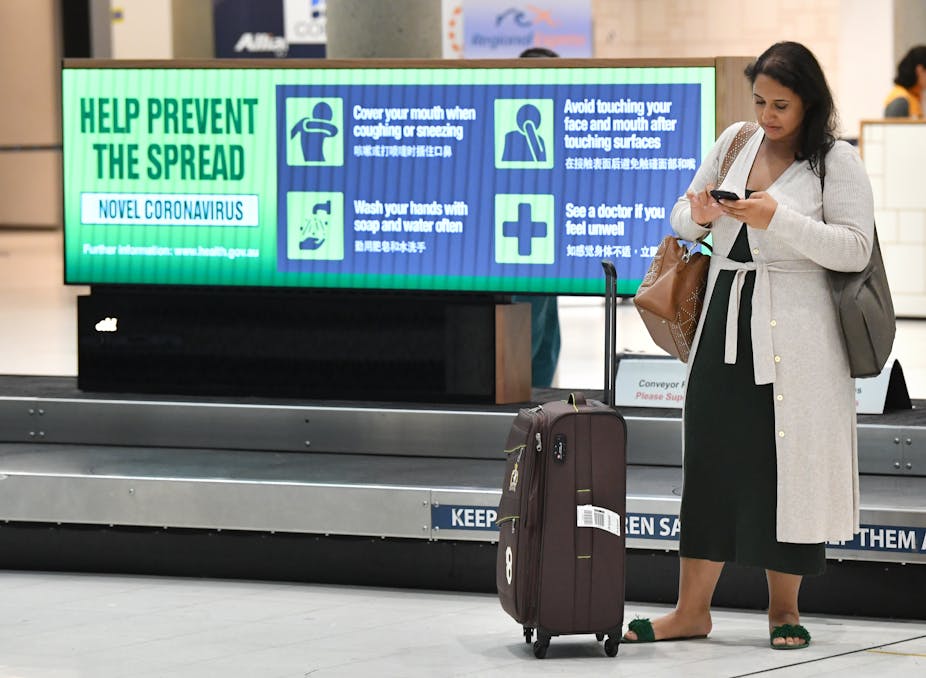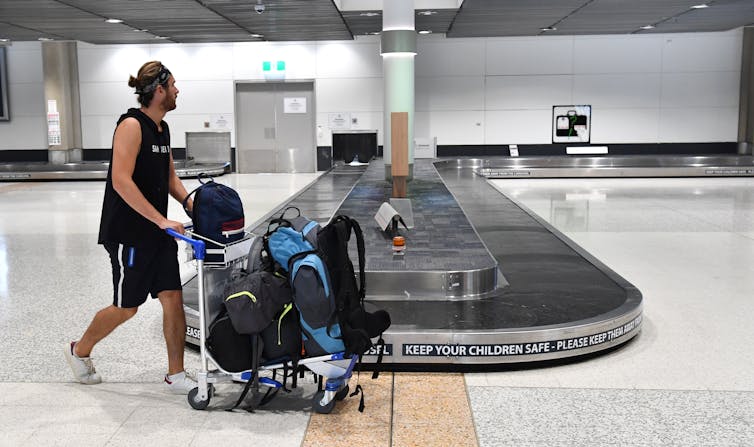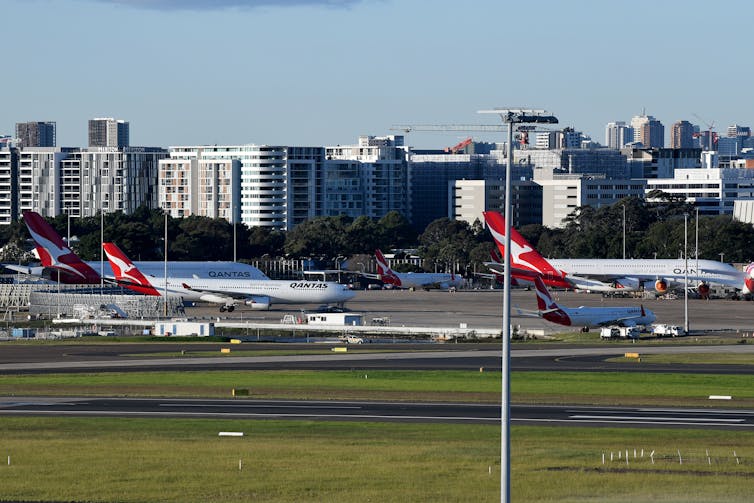Entering or leaving Australia
Australia welcomes millions of overseas visitors each year. Anyone who is not an Australian citizen needs a valid visa to enter the country.
International passenger caps have been removed for all international passenger arrivals into Australia.
All travellers should be aware that: People entering Australia do not need to provide evidence of vaccination status People entering Australia do not need to complete the Digital Passenger Declaration or Maritime Travel Declaration People leaving Australia will not be asked to provide evidence of their vaccination status Unvaccinated visa holders do not need a travel exemption to travel to Australia Mask wearing on international flights to Australia is no longer mandatory . It is important to remember that airlines, vessel operators and other countries may have specific requirements that travellers need to comply with.

Australian Citizens
All Australian citizens must enter and exit Australia on an Australian passport. Your Australian passport must be valid (not expired) on the day of your arrival in Australia. It does not need to have six months remaining validity to enter Australia unless you are passing through a third country that requires it. Citizens are not entitled to a visa, even if you are also a citizen of another country. Please see the Department of Home Affairs website for more information.
Immigration and Visas
All foreign travellers, except New Zealand citizens, must obtain a visa or travel authority before travelling to Australia.
» Immigration and visas
If you have a specific question, please contact the Department of Home Affairs .
You will also need to know what you can and cannot bring into Australia, knowing the duty-free concession limits and what to experience when travelling through Australian airports and seaports.
Please visit the Department of Home Affairs website for more information.
Plan your trip with australia.com , the official Tourism Australia website, offering a wide range of travel information and planning tools including over 2000 images, a currency converter, daily weather updates, interactive maps, suggested holiday itineraries, holiday deals, specialist travel agents and more. Available in nine languages.
Tourist Refund Scheme
The Tourist Refund Scheme enables you to claim a refund, subject to certain conditions, of the goods and services tax (GST) and wine equalisation tax (WET) that you pay on goods you buy in Australia.
Travel exemptions to leave Australia officially scrapped for fully vaccinated travellers from November 1
Topic: Federal Government
The federal government has removed the need for fully vaccinated Australians to ask for permission to leave the country from Monday, but those who are unvaccinated will still have to ask for an exemption if they want to leave.
Key points:
- Health Minister Greg Hunt has signed off on changes that will allow Australians to leave the country from Monday
- People will need to prove they have received two doses of an approved vaccine
- From Monday, Australians returning from overseas will not have to quarantine at all in New South Wales
When the government closed the international border in March last year it also barred Australians from leaving the country unless they had an exemption.
It was able to make the rules under the Human Biosecurity Determination — a law created to protect the population from people bringing COVID to Australia from overseas.
Last night, Health Minister Greg Hunt changed the Determination so that from November 1, anyone who was fully vaccinated could leave as they pleased.
"Australian citizens and permanent residents who want to travel overseas will need to provide proof that they are fully vaccinated with a [Therapeutic Goods Administration]-approved or recognised vaccine, with the second dose occurring at least seven days prior to travel," he said.
"These changes will also facilitate travel by children under 12 years of age."
The TGA has approved four vaccines for use in Australia — Pfizer, Moderna, AstraZeneca (now known as Vaxevria) and Johnson and Johnson.
But it is also considering several from other countries including China, India and Russia that could be recognised as vaccines that provide protection against COVID-19.
It has recommended that the Covishield vaccine from India and the Sinovac vaccine from China be recognised in Australia.
Mr Hunt said the change was the first stage in Australia's international reopening, with the second stage focused on allowing international students and critical workers back into the country.
As for those who have not been vaccinated, they will still have to apply to leave the country and say why they want to travel.
They will also be subject to passenger caps when they return to Australia and undertake 14 days in hotel quarantine.
The November 1 date coincides with the changes to quarantine arrangements in New South Wales , with fully vaccinated travellers no longer required to undertake any quarantine.
As well as the changes to exemptions, the government has also clarified the rules around pre-flight testing for people wanting to come back to Australia, from 72 hours to a general three-day rule.
There’s a ban on leaving Australia under COVID-19 . Who can get an exemption to go overseas? And how?
Senior lecturer, University of Technology Sydney
Disclosure statement
Anthea Vogl does not work for, consult, own shares in or receive funding from any company or organisation that would benefit from this article, and has disclosed no relevant affiliations beyond their academic appointment.
University of Technology Sydney provides funding as a founding partner of The Conversation AU.
View all partners

Australians are all too aware of the restrictions on interstate travel and on who can currently enter Australia .
But people may not realise there is also a ban on overseas travel for all Australian citizens and residents, subject to a limited number of exemptions.
Since March, about one in three requests to leave the country have been granted. This comes amid reports of Australians facing huge hurdles to see sick and dying relatives overseas.
So, what’s going on? Who can actually leave Australia at the moment?
What is the ban?
The ban on leaving Australia was put in place by Health Minister Greg Hunt on March 25, as an “ emergency requirement ” under the Biosecurity Act. It is the first time Australia has had such a ban, and it was made on the advice of the Australian Health Protection Principal Committee.
The determination says plainly:
An Australian citizen or permanent resident … must not leave Australian territory as a passenger on an outgoing aircraft or vessel.
The accompanying statement explains,
[This] is in response to the COVID-19 pandemic, which continues to represent a severe and immediate threat to human health in Australia and across the globe.
Is this legal?
The government legally made the determination under the Biosecurity Act, which gives the health minister power to put in place “ any requirement ” they believe is necessary to prevent or control the entry or spread of the virus into Australia.
International law recognises the right to leave any country, including your own, but there is no equivalent constitutional protection in Australia.

In other words, Australians don’t have a constitutional right to leave Australia.
Strict exit bans for citizens are generally associated with authoritarian states, like North Korea and the former USSR. But the Health Department has said the ban is needed because of the burden returning residents place on quarantine arrangements, the health system and testing regimes.
The government has also argued it is “ impossible ” to only ban travel to specific places, due to the fast-moving nature of the pandemic in different countries.
Who can leave Australia at the moment?
Anyone who isn’t a citizen or resident is allowed to leave Australia.
Some Australians are also still free to leave. This includes those who are “ordinarily resident in a country other than Australia”, airline and maritime crew, outbound freight workers, and essential workers at offshore facilities.
Read more: Australians don't have a 'right' to travel. Does COVID mean our days of carefree overseas trips are over?
All other citizens and residents must have an exemption if they want to leave. They need to apply online (which is free) and then bring the approved exemption to the airport.
To be granted an exemption, you must have a “ compelling reason ” for needing to leave Australian territory, and your travel must fall into one of the following categories:
- compassionate or humanitarian grounds
- part of the response to the COVID-19 outbreak
- essential for the conduct of critical industries and business
- to receive urgent medical treatment unavailable in Australia
- urgent and unavoidable personal business
- in the national interest.
Most applications to leave are not successful
Despite these exemptions, it is still difficult to get permission to leave. Only about one in three requests are being granted.
According to Border Force, between March and mid-August it received more than 104,000 requests to leave Australia. About 34,300 exemptions have been granted.
Exemption applications are assessed by Border Force and applicants are advised to apply at least two weeks but not more than three months before departure.
Border Force adds:
If you are travelling due to death or critical illness of a close family member, you can apply inside this timeframe and we will prioritise your application.
However, timeframes haven’t been guaranteed and people have reported significant delays even in emergency situations . If a request is refused, an applicant can reapply.
Failing to comply with the ban is a criminal offence , punishable by up to five years’ prison, a $63,000 fine, or both.
Are Victorians especially banned?
There is nothing to exclude Victorians, currently under Stage 3 and 4 restrictions, from applying to leave Australia.
The Victorian government directs residents to federal government advice regarding overseas trips.
However, Victorians would also need to comply with or seek exemptions from state-based restrictions (including for travel to the airport, for example) where an exemption was granted.
What are the problems with the ban?
Usually when governments pass legislation, they provide definitions of key terms. However, no definitions for any exemptions are included in the travel ban determination , which was made by Hunt and not reviewed by parliament.
What exemptions like “urgent and unavoidable personal business” cover is unclear, to say the least ( luxury yacht , anyone?).

There have been repeated stories of Australians having enormous difficulties getting permission to see family and loved ones overseas. Although recent reports suggest the process is becoming easier.
One woman reported difficulty meeting the “compassionate grounds” exemption because her dying step-parent was not in hospital, due to a choice to spend his last days at home. Another received three different responses to the same request.
Read more: Small funerals, online memorials and grieving from afar: the coronavirus is changing how we care for the dead
Applicants must provide sufficient documentation , but it is also unclear what documents are required. People whose documents are not in English must have them officially translated as part of an application. Those in distressed or bereaved states must nonetheless gather complex documentary evidence , which may include death certificates, or proof of an event or relationship.
Due to this lack of clarity, some people are seeking the advice of migration agents to help them leave Australia.
This adds to the ever-growing costs of mobility during the pandemic, while creating the extraordinary circumstance where legal advice is needed to help residents and citizens depart their own country.
When will the ban end?
Australia’s complete travel ban has not been adopted in similar countries. In New Zealand , Canada and Britain , overseas travel is strongly advised against but not banned.
Other countries to have completely prohibited travel include Kazakhstan, Lithuania and Uzbekistan.
Read more: How COVID-19 could impact travel for years to come
Australia’s ban will automatically cease when the “biosecurity emergency period” is declared over, unless revoked beforehand.
But while the the current period runs until September 17 , it is likely to be extended. In June, Hunt warned borders will remained closed for a “ very significant ” amount of time.
Although he also described Australia as an “ island sanctuary ”, it’s unlikely the many people held on either side of its borders feel the same way.
- Biosecurity
- Australian Border Force


Research Fellow Virology

Integrated Management of Invasive Pampas Grass for Enhanced Land Rehabilitation

Economics Editor

Deputy Vice-Chancellor (Indigenous Strategy and Services)
Lecturer / senior lecturer in construction and project management.

Search Smartraveller
Easing restrictions for australians travelling overseas.
Changes to the requirements for travel into and out of Australia came into effect on 18 April 2022. So what does that mean for your overseas trip?
Pre-departure testing is no longer required
When travelling to Australia, you no longer need to provide a negative COVID-19 test result to board your plane.
It’s important to remember that transport providers, transit locations and the state or territory you arrive in may still have testing requirements. Always check the requirements before you travel.
You still need to complete the Digital Passenger Declaration when travelling to Australia. And you must still wear a mask at all times if you’re travelling to Australia by air.
Cruise travel into and out of Australia has resumed
Cruise vessels can once again travel into and out of Australian waters.
COVID-19 remains a global health risk , and infectious diseases such as COVID-19 can spread quickly onboard cruises. Carefully consider the risks of international travel before you book.
The Department of Health recommends that you avoid cruise ship travel if
- your routine COVID-19 and travel vaccinations aren’t fully up to date
- you’re in a vulnerable group that puts you at greater risk of severe illness from COVID-19.
If you’re travelling to Australia on a cruise, you must complete a Maritime Travel Declaration before you board your vessel.
Read our advice on cruising overseas for more information.
Exemptions are no longer required to leave Australia
Unvaccinated Australian citizens and permanent residents can now leave Australia without an individual travel exemption. But you may still be asked about your vaccination status. You’re required to show proof of your vaccination status if you’re asked by an Australian official or your transport provider.
The Australian Government recommends passengers leaving Australia be fully vaccinated against COVID-19 and travel with proof of vaccination status documentation. If you’re unvaccinated, you’re strongly discouraged from international travel due to the health risks.
Airlines, cruise lines and other destinations can still have their own vaccination policies. You may face difficulty finding transport options if you’re unvaccinated.
Before you decide to travel
Remember Only the Australian federal border restrictions have changed. Foreign governments, transport providers and Australian states and territories can have their own requirements for COVID-19 testing and vaccination. Your transport provider can refuse to allow you on board if you’re showing symptoms of COVID-19 you don’t meet their vaccination or testing requirements you don’t meet the requirements of your destination you refuse to wear a mask when required.
To understand all the rules and requirements before committing to an overseas trip:
- Read our Global COVID-19 Health Advisory and our step-by-step guide to travel during COVID-19 .
- Read and subscribe to the travel advice for your destination , as well as all your transit locations. Make sure you understand their entry and exit requirements, and their vaccination requirements beyond the border.
- Contact your transport providers to confirm their vaccination and testing requirements.
- See our information on leaving Australia
- Learn about Australia’s re-entry and biosecurity measures
- Read about COVID-19 vaccinations and travel
- See our COVID-19 FAQs
- COVID-19 and the border (Department of Home Affairs)
- Advice for Australian travellers (Department of Health)
- Skip to navigation
- Skip to main content
Popular searches
Your previous searches.
- Integrated Cargo System (ICS)
Changes to travel exemption statement
On 1 August 2021 the Minister for Health and Aged Care amended the Biosecurity Determination 2020 so that Australian citizens and permanent residents who are ordinarily resident in a country other than Australia are no longer automatically exempt from Australia's travel restrictions.
From 11 August 2021, Australians who usually live overseas can still leave Australia by applying for an exemption and demonstrating their links to the country where they usually live.
This brings travel exemption requirements in line with those for other Australians.
This amendment is designed to better assist vulnerable Australians overseas to return home, and prevent frequent travel between Australia and other countries, keeping the system fair for all.
Australians living overseas can apply for an exemption before travelling to Australia, to provide certainty prior to commencing their journey.
Information about applying for an exemption and the supporting evidence required is available at supporting evidence required is available at https://covid19.homeaffairs.gov.au/leaving-australia
Need a hand?
- Skip to navigation
- Skip to main content

Popular searches
Your previous searches.
Australia’s border rules apply to everyone
Any individual seeking to enter Australia must comply with our strict border requirements.
While the Victorian Government and Tennis Australia may permit a non-vaccinated player to compete in the Australian Open, it is the Commonwealth Government that will enforce our requirements at the Australian border.
Since 15 December 2021 fully vaccinated eligible visa holders can travel to Australia without needing to apply for a travel exemption, and enter eligible states and territories quarantine free.
If an arriving individual is not vaccinated, they must provide acceptable proof that they cannot be vaccinated for medical reasons to be able to access the same travel arrangement as fully vaccinated travellers.
Australian Border Force will continue to ensure that those who arrive at our border comply with our strict border requirements.
No individual competing at the Australian Open will be afforded any special treatment.
Quarantine requirements for international arrivals in Victoria, including for non-vaccinated individuals, are a matter for the Victorian Government.
More information about international border restrictions is available at the Department of Home Affairs website .
Need a hand?

IMAGES
VIDEO